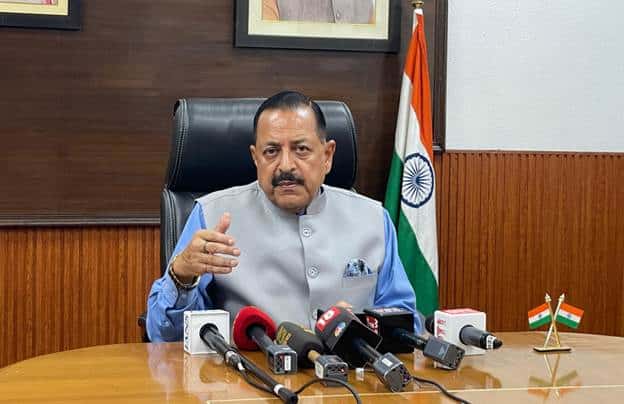Promoting the Principles of Atmanirbhar Bharat and Vishwabandhu

In a significant milestone for India’s space exploration efforts, Union Minister of State for Science and Technology, Dr. Jitendra Singh, celebrated the successful docking of the Dragon spacecraft with the International Space Station (ISS). The spacecraft is carrying Indian astronaut Group Captain Shubhanshu Shukla and three other crew members. Dr. Singh emphasized that the mission embodies the spirit of “Atmanirbhar Bharat” and “Vishwabandhu Bharat,” showcasing India’s commitment to indigenous scientific advancements and international collaboration in space research.
India’s Indigenous Contributions to Space Research
Dr. Jitendra Singh highlighted that all experiments conducted by Group Captain Shubhanshu Shukla aboard the ISS are developed by Indian institutions. This initiative marks a pivotal shift in India’s role in space exploration, moving beyond merely launching missions to actively shaping scientific research in microgravity. The minister stated, “India’s role in space exploration is no longer limited to the launchpad. We are now shaping the future of life and science in space.” He underscored that the results of these experiments would not only benefit India but also contribute to the global scientific community.
The mission includes seven fully indigenous microgravity experiments, each designed to address various scientific challenges. Dr. Singh affirmed that these experiments reflect Prime Minister Narendra Modi’s vision for a self-reliant India and a collaborative global approach to scientific discovery. The knowledge gained from these experiments is expected to serve as a significant contribution to humanity, enhancing our understanding of life in space and its implications for Earth.
Key Experiments Conducted in Microgravity
The first experiment focuses on the study of edible microalgae, led by the International Centre for Genetic Engineering and Biotechnology (ICGEB) and the Biotechnology Research Institute of the National Institute of Plant Genome Research (BRIC-NIPGR) in New Delhi. This research aims to observe the growth and metabolism of three selected varieties of edible microalgae in microgravity. The findings could have profound implications for improving crew nutrition, enabling wastewater recycling, and facilitating carbon dioxide to oxygen conversion, which are essential for long-term space habitation.
Another significant experiment, conducted by the University of Agricultural Sciences (UAS) Dharwad and the Indian Institute of Technology (IIT) Dharwad, investigates the germination and nutritional properties of moong and methi seeds in space conditions. The results are anticipated to contribute to the development of nutritious food supplements for astronauts while exploring the medicinal benefits of these sprouts in a microgravity environment.
Addressing Health Challenges in Space
The third experiment, developed by BRIC-InStem in Bengaluru, tackles the critical issue of muscle loss experienced by astronauts in space. By mimicking muscle regeneration in microgravity, this study aims to uncover the biological mechanisms behind muscle degradation and identify potential interventions to maintain astronaut health. Insights gained from this research could also lead to new rehabilitation therapies for muscle-related disorders on Earth.
Additionally, researchers from the Indian Institute of Science (IISc) Bengaluru are examining the survival and reproduction of tardigrades, known for their resilience, under space conditions. This study is expected to provide valuable data on human adaptability and survival strategies in extreme environments, both in space and potentially on Earth.
Innovative Approaches to Space Agriculture and Technology
The fifth experiment, also conducted by IISc Bengaluru, focuses on how astronauts interact with electronic displays in microgravity. Understanding this interaction will help design safer and more efficient spacecraft control systems. The sixth experiment explores the growth of cyanobacteria using urea as a nitrogen source in microgravity, which could support sustainable systems for carbon and nitrogen recycling in space.
Lastly, the seventh experiment involves testing the resilience of various seeds, including rice and tomato, that have been exposed to microgravity. This research aims to assess the impact of space conditions on these seeds, with the goal of advancing space agriculture and developing climate-resilient plant varieties suitable for cultivation on Earth and beyond.
Dr. Jitendra Singh concluded by emphasizing that these pioneering efforts signify India’s emergence as a global leader in space biosciences. He stated, “India is no longer a follower; we are leading missions of planetary relevance. These experiments will open new frontiers for sustainable life in space and resilient ecosystems on Earth.”
Observer Voice is the one stop site for National, International news, Sports, Editor’s Choice, Art/culture contents, Quotes and much more. We also cover historical contents. Historical contents includes World History, Indian History, and what happened today. The website also covers Entertainment across the India and World.

